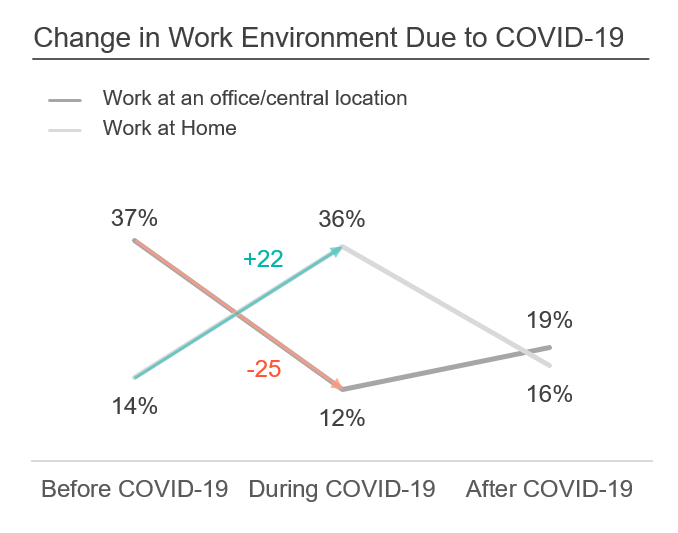
It’s no secret that a significant number of people are now working from home. And, while some may go back to the office after Labor Day, many others will not feel comfortable doing so. Until we get a vaccine or another effective means to prevent transmission, our COVID-19 reality opens up several potential long-term issues with data security.

IT leaders across industries are facing a more decentralized labor force, with more bring-your-own-device (BYOD) policies. They will need to create new business rules for supporting and securing these devices as well as explore new technology solutions to help keep businesses running efficiently and effectively.
Urgent Needs: Supporting Businesses with Tech and Support
When assisting businesses with remote workers, tech companies can leverage their knowledge and technology to provide blueprints to IT departments to help them secure remote working arrangements and offer support to firms whose resources are already stretched thin.
As the Identity Management Research Institute points out, businesses must examine several areas when embracing a remote worker philosophy, including:
- A strict and clear remote worker policy
- Mobile device management protocol for employee devices
- Secure connectivity via insistence on using only a secure WiFi or VPN
- Ongoing education for all employees on data security
One way we help tech companies determine which industries and/or businesses have the highest need for certain types of support is through qualitative research. Many of our recent studies have helped tech firms understand what business owners need more of now, quickly identifying the key areas where support and innovation are urgently needed.
Future Needs: Innovation Will Lead the Way for Tech and Telecommuting
If we reach the end of 2020 with no vaccine widely available, this may become even more of a “new normal” as companies grapple with how to keep workers safe in home-office environments. And, innovation for how we move forward from our home offices will be more important than ever to keep the wheels of productivity moving as we navigate our new work spaces.
While many thought there would be a decrease in productivity when workers went remote, leaders found that productivity has actually increased. This article by The New York Times looks at Softbank Robotics as a prime example of how allowing their employees to work from home has improved business. Softbank Robotics sells robotic vacuums for hotels and other large venues. Before the pandemic, the sales process involved a lot of travel to facilitate in-person sales. Current circumstances transformed the company’s sales process into a 10-minute online demo with a high closing rate. No air travel. No hotel. Happy sales people. This is, by all accounts, a win-win situation.
That said, many of these efficiencies have another side that warrants serious attention and new solutions. While tools and technology are working for many to sustain productivity, the trick for many companies is finding new ways to help employees survive video call fatigue and concurrently secure confidential data. Companies like Accenture are working with consultants to reimagine how to virtualize every part of each employee’s work day so that it can be done remotely.
“It has accelerated three years of digital cultural adaptation to three months,” says CTO Paul Doherty. This shift in how we work together indicates there is a new niche for tech companies and new entrants to explore and grow.
New Security Needs: Closing the Gaps in Security from E-commerce to Oil Rigs
Not only are tech companies integral to providing data privacy protocols to protect customer data, they can help button up business processes. An example is helping to secure any company who sells products and services online—which today is most companies—and the number is growing daily because of the pandemic.
As companies look for new ways to deliver products and services to customers, artificial intelligence (AI) and machine learning are expected to lead the way. According to a report by Technavio, the AI industry is set to grow exponentially (by $14.5 billion) through 2023 due to the need of securing e-commerce platforms and keeping shopper transactions/company data safe.
Other areas where tech can help address data security gaps are in securing logistics and supply chain management. In a recent client study we performed, business and IT decision-makers discussed the importance of managing companies where employees and customers are spread out and sometimes in hard-to-reach areas. For example, think oil companies and the logistics around shipping key items to personnel deployed in the middle of the ocean. Here, tech companies can provide businesses with secure connections using different protocols to ensure that items get delivered and communication stays flowing no matter what the item is or where the customer or employee is located.
It is essential to ensure that corporate communication focuses on clear messaging that illustrates how tech companies are working hard to help keep data secure across industries and different business challenges. Here again is where tech research partners can play a role in helping to make sure that tech messaging is hitting on all of the pertinent needs that tech can help to solve for businesses, focusing on those challenges that are important to business and technology decision-makers.
How We Move Forward
As tech companies step up to address the business and personal needs of remote workers, there is an opportunity to stand out from competitors by demonstrating ease of doing business and innovating to help companies maintain security for their business, employees and consumers.
In regard to the security of personal information, tech companies have promised to rise to the challenge, stating they will “police themselves to protect consumer data.” Currently, no comprehensive US laws exist to protect individual privacy and only a few states have enacted privacy laws. Because many of these companies have aggressively moved forward with ideas and solutions to use technology to stop the spread of COVID-19, this is an important first step for a myriad of reasons—the biggest one being consumer trust. Messaging on this is incredibly important—keep messaging focused on these three key themes:
- Keep your customers’ data secure
- Keep your employees productive and supported wherever they work
- Improve operations for your company by using technology that can support enterprises with a dispersed and remote workforce
If you would like to learn more about how we help technology companies with challenges from innovation to messaging and everything in between—send us a note. We can help you identify what means the most to your customers and provide a clear roadmap to drive more customers to your brand.









